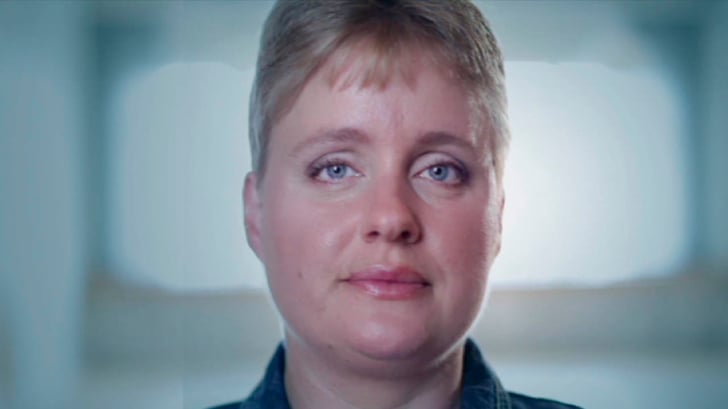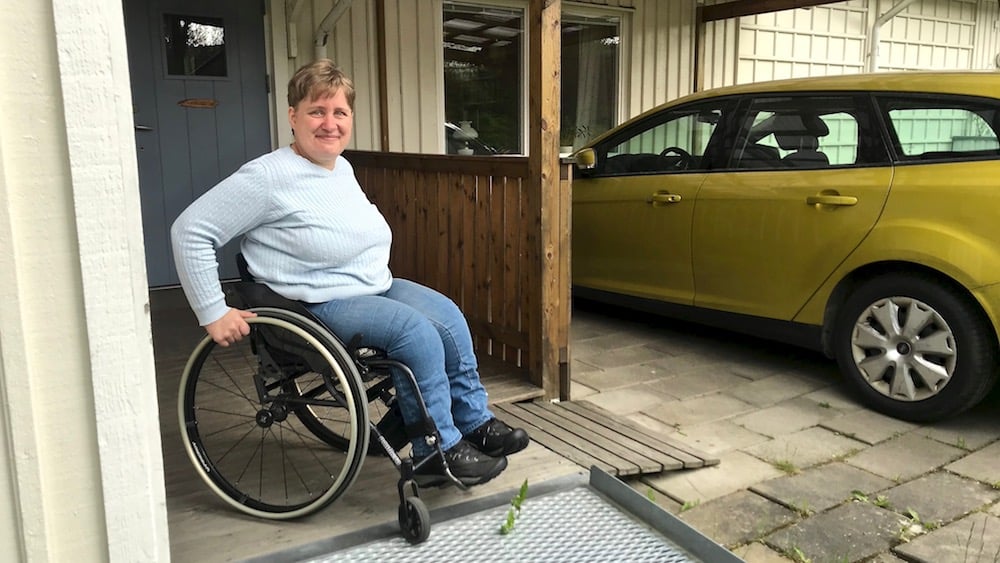To be born with Spina Bifida is to be used to the obstacles the condition presents – nevertheless, you do get tired of them from time to time. We met Ida Rönnblad – sociable, positive and a passionate bird-watcher. Over a cup of coffee we discussed what freedom and dignity means to her.

Ida Rönnblad loves hanging out with friends, going to musicals and being in nature, especially if there is a chance of spotting a species of rare bird – a hobby that can present challenges for a wheelchair user. Ida was on an island trip when she heard that someone had spotted an egret – a bird she didn’t have in her log book.
– They said it should be okay for me to go there, so I went into the woods with high expectations. Everything was going fine until I was almost there, and a footbridge lay before me. The edge was too high for me to get up, and even if I approached it with some speed, the roots on the path hindered me. I was so annoyed…
Ida is used to her disability and is strong and independent, but it can still weigh upon her mood sometimes. Especially when things are out of reach or people talk over her head.
The classic situation is when someone borrows the handicap parking for ‘just a minute’ or when a huge pile of snow is put there after clearing the parking lot. Last winter I had to call my retired dad when I couldn’t get to work because of the snow. He is glad to help, but who wants to be driven to work by a parent, when you are forty plus?
Ida’s condition also comes with urinary issues. She needs intermittent catheters to empty her bladder, and sometimes she has leakage. Ida doesn’t always feel the need to go to the toilet, so she goes regularly anyway to mimic an ordinary bladder emptying routine.
– The whole process takes a little bit longer than for other people. Simple things such as pulling down my pants can take a while. At home everything is within reach but being out and about – it can differ. Sometimes the room is too small and sometimes it is actually too big, and you can’t reach the sink or the paper even.
Incontinence
The leakage situation is the most embarrassing part and even if it seldom happens, it causes some uncertainty for Ida. Having a coffee or a beer with a friend might speed up the bladder and she needs to be extra attentive. Ida remembers a situation when the union arranged a movie night at the cinema.
– It started with a nice mingle with food and drinks and I had a really nice time. My plan was to go to the toilet before the film started, but suddenly everyone went into the salon to listen to a presentation. After the film I noticed a leakage, and there I was, in the cinema chair having to move to my wheelchair, afraid there might be a smell when I got up. The smell is my worst fear…
Ida has had good experiences from healthcare providers even though she sometimes notices a lack of knowledge, both around her spina bifida and her continence situation. She gets her medications and continence aids from her local health center and only occasionally sees a specialist for a renal function test, or to address something specific.
The district nurse is very helpful but maybe not so pro-active in keeping updated with the latest knowledge and news. Money seems to be a factor too. It was only by coincidence that I found out about hydrophilic catheters and asked for them. Until then I used dry catheters and gel.
Ida has found out more about her condition and urinary issues by talking to friends in the same situation, reading articles or ads in magazines and taking part in forums online. People often feel that they are passed around different departments, not least between general practitioner, rehabilitation center and specialists without a professional taking full responsibility for managing a service user’s care plan.
– With less prestige, many situations could have been avoided. When doctors don’t have the answer they should take responsibility and ask someone else. And there is a big need for cooperation between the different healthcare providers.
Spina bifida x 2
Ida has a grown-up son who also has spina bifida. Sharing a common condition, they are able to offer each other support. He knows how Ida experienced life as a child and she can share her experience as a service user in the healthcare system. When her son needed to start with catheterization, Ida knew the drill. Ida’s son has retention and can’t pass urine without aids, which can be critical.
– Once, my son ended up in the emergency room and was placed in a room, despite the fact that he needed to empty his bladder. The nurses were meant to return right away, but time went by and my son became increasingly anxious. It is harder to make a point and articulate your needs, and sometimes actually teach healthcare professionals, when you are twenty rather than forty.

Ida doesn’t need an assistant and is very happy about the freedom and integrity she enjoys.
– Assistance is of course great when needed, but it’s surrounded with difficult situations integrity wise – for example, to assess whether someone needs assistance with the toilet, the length of each visit has to be timed.
Under scrutiny
Ida experiences a similar situation when renewing her parking permit every five years. Questioning a permanent condition feels a bit redundant.
– There is no cure and the condition is constant… It is more likely that it gets worse as the body changes with age and you become heavier and more ungainly. I even had a friend who had an amputation; they were asked if it had gotten better since last time.
Our time together is coming to an end as Ida is on her way to work. Before we part, I ask what could improve her life?
– I believe that better communication between the different medical agencies involved in a patients’ care would benefit everyone. I’d also like a smoother transition from pediatric to adult care when you are born with this condition. And overall, a bit of curiosity in new solutions that might make your life easier.




